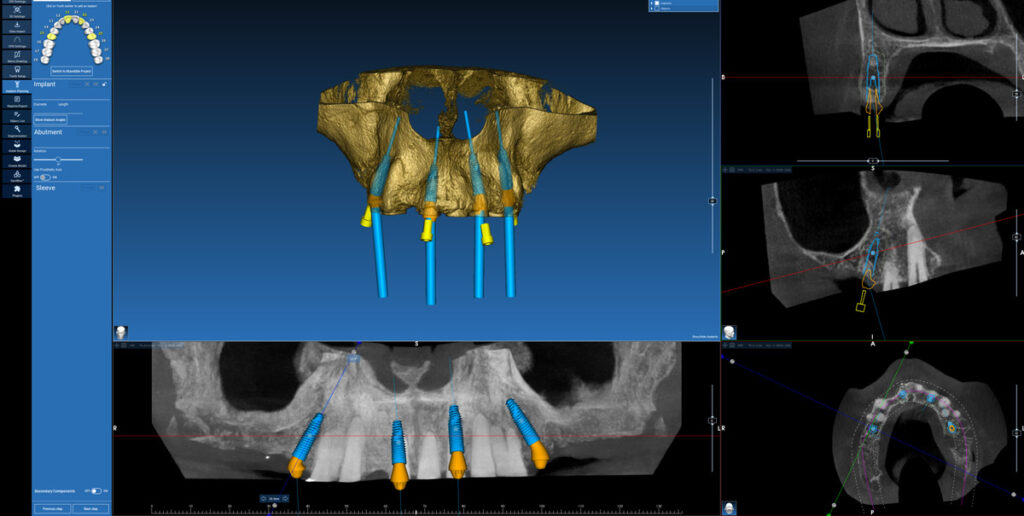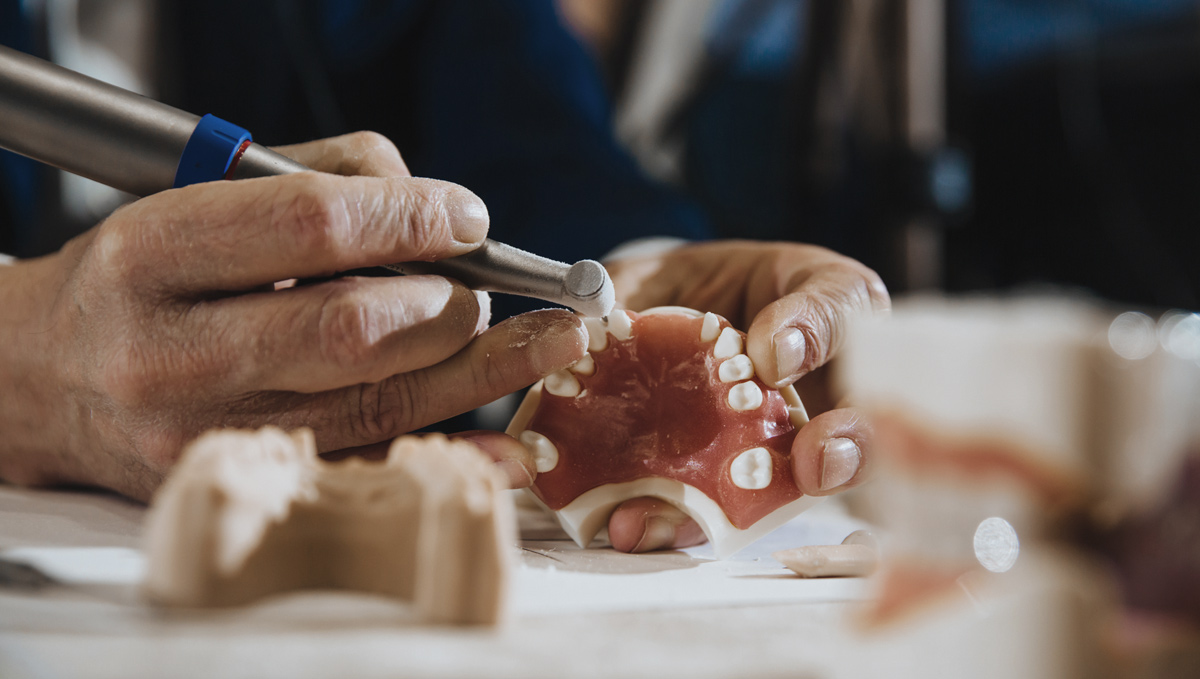Affordable dental implants have become a vital solution for people looking to restore their smile, improve oral health, and replace missing teeth.
With advances in technology, more patients now have access to high-quality dental care without the traditionally high cost. But what actually goes into making dental implants more affordable?
In this behind-the-scenes look, we break down the full dental implant process and explore how clinics are able to offer dental implant treatment at more accessible prices while maintaining excellent standards of care and long-term results.
The basics of dental implants
What dental implants are and how they work
Dental implants are a permanent solution designed to replace missing teeth. They typically consist of a small titanium screw inserted into the jaw bone, acting as a secure foundation for a replacement tooth such as a crown, bridge, or full denture. Once healed, they function just like natural teeth and restore full bite function.
Unlike traditional dentures or a partial denture, implants do not rely on other teeth for support. They integrate directly with the bone, offering a stable and long-lasting option for those with single missing tooth cases or multiple lost teeth. This makes them the best solution for people seeking a long-term and secure method of tooth replacement.
Dental implants are not just cosmetic prostheses designed to improve a person’s self-confidence. They play a vital role in maintaining your oral health, preventing bone loss, and supporting the structure of your face and jaw.
When might dental implants be recommended?
Dental implants are typically recommended when one or more teeth are missing due to injury, decay, or extraction. They are an excellent option for patients who want to replace a single tooth, multiple teeth, or even a full arch of lost teeth with a permanent and natural-feeling solution.
Implants may also be advised for those who have struggled with the discomfort or instability of traditional dentures or removable dentures.
Additionally, patients who have suffered from bone loss, oral cancer, or gum disease might be suggested implants as a way to replace missing teeth, following any required preliminary treatments such as bone grafts.
Common misconceptions about cost and treatment
One common myth is that dental implants are always unaffordable.
While it’s true that implant treatment can be a significant investment, especially if they are to replace multiple missing teeth, innovations in dental technology and streamlined procedures mean more patients can now access affordable dental solutions.
The price of implants varies, and many dental clinics offer flexible payment plans, a free consultation, or a free implant consultation to help patients budget their dental work effectively.
It’s important to remember that the cost is reflective of a permanent solution that, with proper care, can last a lifetime.
Key components of an implant
The implant post: materials, strength, and durability
At the heart of every implant is the titanium screw, chosen for its strength, biocompatibility, and ability to fuse with the jaw bone.
This fusion process is called osseointegration and creates a secure, permanent anchor for a new tooth or full arch restoration.
Titanium is not only durable but also lightweight, which makes it ideal for both single-tooth and multiple teeth replacements. It supports the surrounding bone and helps to prevent further bone loss caused by missing teeth.
Abutment and crown: aesthetics and function
The abutment connects the titanium implant to the visible crown. Together, the abutment and crown are designed to match the shape, colour, and alignment of your natural teeth, restoring both function and aesthetics.
Customised using cutting-edge digital technology, these components are precision-made for a functional smile that looks completely natural. The result is a tooth replacement that is virtually indistinguishable from your original teeth.
How materials influence cost
Titanium vs. zirconia: pros, cons, and price points
Titanium is widely regarded as the best value for dental implant materials due to its durability and integration with bone. Zirconia, a newer ceramic alternative, is metal-free and favoured for its aesthetics, though it may be more expensive.
While zirconia is ideal for patients with metal sensitivities, titanium remains the gold standard for most affordable dental implant treatments. Clinics offering implants at a competitive price often use titanium for its balance of cost, strength, and performance.
Balancing quality with affordability
Choosing the right materials without compromising quality is essential. Affordable dental implant providers work with trusted suppliers to obtain cost-effective, high-quality components, ensuring long-term performance without driving up the total cost.
Clinics offering a lifetime guarantee on their implants reflect confidence in both material and craftsmanship. Whether for a single implant or full mouth restoration, selecting durable materials is crucial for successful outcomes.
Manufacturing processes
How implants are made: precision engineering
Each implant involves advanced manufacturing processes, precision engineering and strict quality control. This ensures the implant fits perfectly and withstands the daily forces of chewing and speaking.
The implant is shaped and tested to support a secure foundation for the abutment and crown. Manufacturing consistency is key in keeping costs predictable and ensuring reliable results for the patient.

The growing role of 3D printing and digital tools
Digital dentistry, including CAD/CAM technology and 3D printing, plays a key role in reducing production times and errors. Dental laboratories can create crowns and abutments more quickly and accurately than traditional methods.
This efficiency allows dental clinics to offer a more affordable dental implant treatment while maintaining high quality and individualised care. CT scans and X-rays also guide dentists in producing highly accurate treatment plans.
The role of dental laboratories
Differences between local and overseas labs
Local labs allow for quicker turnaround times and better communication between the dentist and technician. Overseas labs may offer lower costs but can sometimes compromise on consistency or lead times.
Clinics that work closely with trusted labs are able to maintain quality while still offering competitive pricing for implant treatment.
How labs impact final cost and quality
Dental laboratories are responsible for crafting the replacement tooth or full arch prosthesis. The quality of this work directly affects the longevity and look of your implant.
Using efficient lab processes and maintaining clear communication with the clinical team helps reduce remakes and extra appointments, lowering overall treatment costs. Patients should ensure their individual treatment plan includes information on lab work and materials used.
Clinical expertise and training
Why experienced clinicians matter
The success of dental implant surgery depends heavily on the skill of the dentist. Experienced implantologists are able to perform complex procedures such as full mouth restoration, bone grafts, and sinus lifts with precision.
Clinics with well-trained teams may streamline the implant process, minimising complications and additional costs. Expertise also helps in assessing suitable candidates for implant procedures and creating a personalised treatment plan for them.
The hidden costs of poorly done implants
Choosing a low-cost provider without the right expertise can result in failed implants, bone loss, or gum disease. These complications require costly corrective treatment and impact long-term oral health.
Affordable does not mean cheap. A balance between cost and qualified care is essential. Nervous patients should also look for clinics that offer sedation or use local anaesthesia to ensure comfort during the procedure.
Cost-saving innovations in dentistry
Digital imaging and guided surgery
With tools like the CT scan and digital planning software, clinicians can identify the best placement for each implant with pinpoint accuracy. Guided dental implant surgery reduces risk, speeds up healing, and minimises discomfort.
These innovations also lead to more predictable outcomes, saving time and money for both patients and clinics. Guided surgery is especially helpful for those receiving multiple implants or full arch replacements.
Minimally invasive procedures to reduce chair time
Thanks to new techniques and tools, implant procedures are becoming less invasive. In some cases, teeth can be placed on the same day as the implant, reducing the need for multiple appointments.
This streamlining benefits nervous patients who prefer fewer visits and supports a faster return to a functional smile. Immediate loading implants and the All-on-Four dental implant procedure are great examples of this efficient approach.
Regulations, standards, and safety
How UK regulations affect implant pricing
The UK maintains strict standards for medical and dental devices. All implants must comply with MHRA regulations and be sourced from approved manufacturers.
These safety standards can add to the cost of materials and procedures but are crucial for protecting patient health and well-being. Adherence to these standards is a hallmark of reputable dental clinics.
Ensuring patient safety without inflating costs
Top clinics focus on efficient operations and careful planning rather than cutting corners. Using properly sterilised equipment, high-quality implants, and safe anaesthetic techniques like local anaesthesia keeps patients safe while maintaining reasonable costs.
Affordable dental care should never mean compromising on health and hygiene. Safety is part of the value provided by responsible dental treatment providers.
What patients should know
Tips for evaluating cost vs. value
Look beyond just the price list. Ask what’s included in the treatment plan: consultations, X-rays, CT scans, aftercare, sedation options, and whether the clinic offers a lifetime guarantee.
A slightly higher cost may represent better overall value when you factor in durability, success rates, and patient care. The best value is achieved when the procedure is done right the first time and requires no costly revisions.
Questions to ask your implant provider
- Am I a suitable candidate for implants?
- Do you offer a free implant consultation or free check-up?
- What does the full treatment plan include?
- Are payment plans available?
- What happens if complications occur?
- How experienced is the dentist performing the implant procedure?
These questions help you make an informed decision and avoid unexpected costs. Choosing a provider with transparent communication and a clearly defined implant process is key to success.
GoDigital Dental: where dental implants come to life
At GoDigital Dental, we support dentists with a seamless, fully digital workflow for implant solutions that combine precision, efficiency and aesthetic excellence.
Our GDC-registered technicians use advanced CAD/CAM technology, 3D imaging and digital impressions to deliver predictable results with minimal chair time. From single-unit cases to full arch restorations, every implant is crafted with clinical accuracy and attention to detail.
We understand the demands of modern practice, which is why we offer real-time communication, shade matching, virtual smile design and streamlined case tracking. With DAMAS-certified quality assurance, reliable turnaround times and on-demand training support, we help practices deliver high-quality care while improving efficiency.
At GoDigital Dental, we do more than manufacture implants; we help you bring every case to life.



